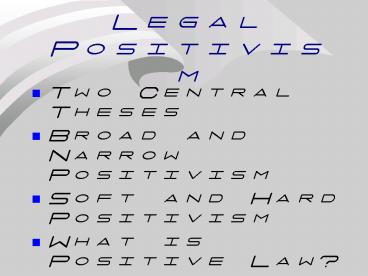Legal Positivism - PowerPoint PPT Presentation
1 / 16
Title:
Legal Positivism
Description:
Narrow (legal) positivism: in addition to the positive law, objective ... Utilitarian positivism: there are no natural human rights, nothing ... positivism. ... – PowerPoint PPT presentation
Number of Views:2407
Avg rating:3.0/5.0
Title: Legal Positivism
1
Legal Positivism
- Two Central Theses
- Broad and Narrow Positivism
- Soft and Hard Positivism
- What is Positive Law?
- The Command Theory
- The Social Convention Theory
2
Two Central Theses
- Issues of legal validity must be strictly
separated from questions of morality. What the
law ought to be has nothing to do with what the
law actually is. - There are irreducible facts about political
society that can only be expressed in the
vocabulary of the law. The study of the law is
autonomous.
3
Broad and narrow positivism
- Broad positivism ( moral/legal conventionalism).
There is only the positive law there are no
objective, universal facts about morality, about
what the law ought to be like. Hans Kelsen - Narrow (legal) positivism in addition to the
positive law, objective moral facts may exist.
Legal validity is independent of moral
justifiability.
4
Two kinds of (narrow) legal positivism
- Utilitarian positivism there are no natural
human rights, nothing like a natural law. The
only moral standard is one of the desirability of
the consequences of the law. Bentham - Non-utilitarian narrow positivism. There is
something like natural law (universal human
rights, universal moral principles).
5
Common ground
- A positive law is binding even if it is supremely
immoral. - No principle of morality is legally binding until
it has been enacted into positive law. - That a statute is legally binding does not settle
the moral question of whether we ought (morally
speaking) to obey or disobey the law.
6
Soft vs. Hard Positivism
- Soft positivism there is no necessary connection
between the content of law and the truths of
morality. - Hard positivism there is, of necessity, no
connection between the content of law and the
truths of morality.
7
Soft Positivism
- Defended by H. L. A. Hart.
- Society may, if it chooses, incorporate the
principles of morality into the law. E.g.,
prohibitions of cruel punishment, requiring
just compensation. - However, this is merely an option no moral
principle is legally binding unless it is
incorporated into the law.
8
Hard Positivism
- Defended by Joseph Raz (Oxford).
- It is impossible for the law to incorporate moral
ideas or principles. - Apparent cases of this are merely decorative,
without legal force. - Why? The purpose of the law is to enable society
to avoid and resolve disputes. Applications of
moral truths are always disputable.
9
What is positive law?
- The Command Theory (Bentham, Austin)
- The Social Convention Theory (Kelsen, Hart)
10
Bentham/Austin Command Theory
- X is the superior of Y if and only if Y is in the
habit of obeying X, and not vice versa.
11
The Sovereign
- A collection S of human beings constitutes an
independent political society just in case there
is one member X (or some compact body X of
members) of S that is the superior of all of the
other members of S, and there is no human being Y
outside of S who is the superior of X. In such a
case, X is called the sovereign of society S.
12
Commands
- A command from X to Y is the expression, in words
or actions, of the desire of X that Y act in a
certain way, backed up by a stated or implied
threat to impose some penalty on Y if Y does not
comply.
13
General Commands
- A general command is a command that is issued to
an entire class of individuals and that is
intended to stand for an indefinite period, until
revoked by its issuer.
14
Positive Law
- A positive law is a general command issued by the
sovereign of an independent political society to
some or all the members of that society.
15
Some problems with the command theory.
- The theory applies clearly to an absolute
monarchy, but is much less clear when applied to
a society where some group is the sovereign. - What exactly does it mean to obey a group?
- Can a group issue commands (in Austin's sense) --
can a group share a single desire?
16
More problems
- H. L. A. Hart argues that the command theory
cannot distinguish between a legitimate
government and an armed robber ("give me your
money or else"). The "Gun Man" objection. - Parliamentary or constitutional law, laws
governing the actions of the sovereign, do not
count as law at all.






























![[READ]⚡PDF✔ The Concept of Law (Clarendon Law Series) 3rd Edition PowerPoint PPT Presentation](https://s3.amazonaws.com/images.powershow.com/10061263.th0.jpg?_=202406210712)
